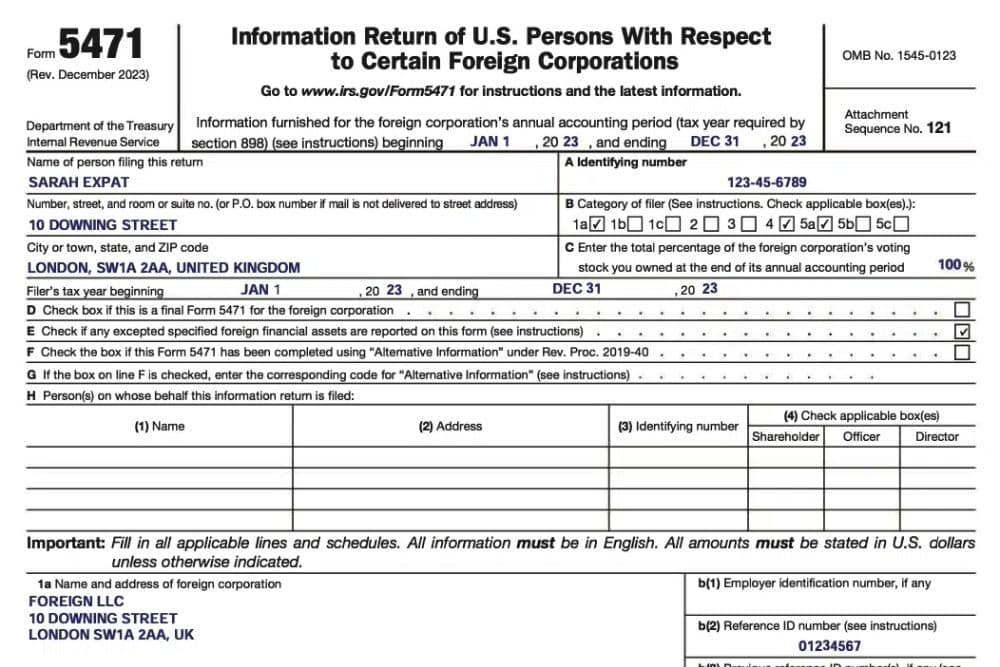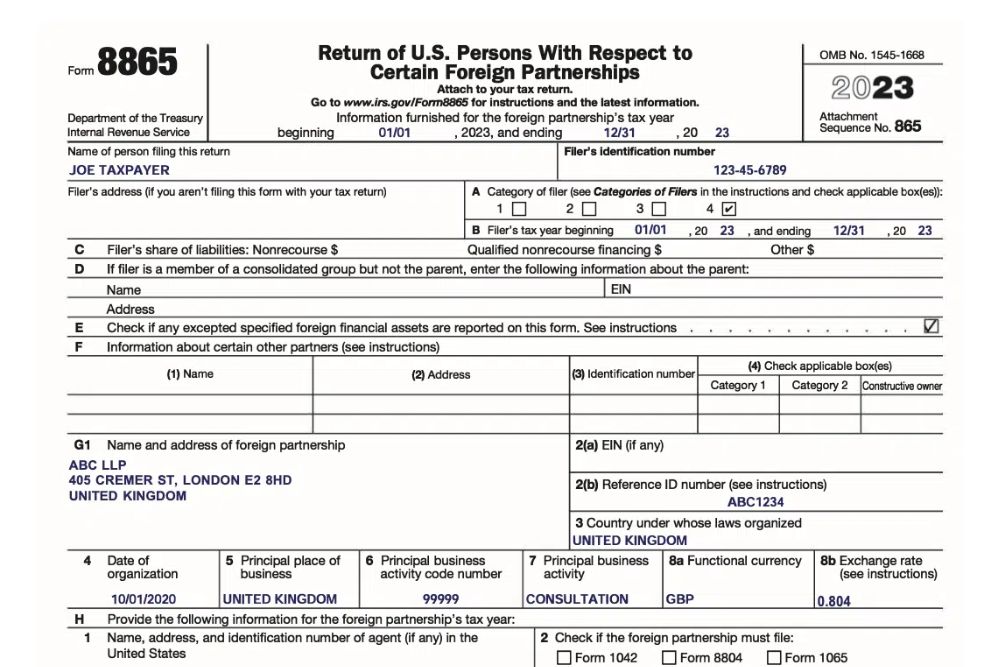Form 5471: Filing Requirements with Your Expat Taxes

- What is Form 5471?
- Who Must File Form 5471?
- What Is a Controlled Foreign Corporation?
- Controlled Foreign Corporation Examples
- Form 5471 Filer Categories
- What If My Ownership Predated Becoming a US Citizen?
- Form 5471 vs. Form 5472
- Form 5471 and Your US Tax Liability
- Form 5471 Deadline
- How to Request a Form 5471 Extension
- Instructions for Filing Form 5471
- What Information Is Required on Form 5471?
- Form 5471 Schedules
- Form 5471 Penalties
- Can I File Form 5471 Myself?
- Need Help Filing Form 5471 for Your Foreign Business? We Can Help!
Living abroad as a US expat is the adventure of a lifetime, especially when you can live out your professional dreams of becoming an entrepreneur. While this lifestyle typically affords you the flexibility you desire, it does bring specific expat tax requirements that you should be aware of.
This article will highlight the top questions expats have about filing Form 5471 as an overseas business owner.
Related: Essentials on Starting a Business Overseas as a US Citizen
Key Takeaways
- The purpose of Form 5471 is to ensure that the IRS has access to the information it needs to enforce tax laws concerning the varied activities of foreign corporations and their owners.
- Form 5471 is required when a foreign corporation has US shareholders, officers, or directors and certain stock ownership thresholds are reached.
What is Form 5471?
Officially known as Form 5471, Information Return of US Persons with Respect to Certain Foreign Corporations, this form is required to be filed along with your income tax return for US citizens and US resident aliens who are officers, directors, or shareholders in certain foreign corporations.
Who Must File Form 5471?
You will have to file Form 5471 if you are a US citizen, green card holder, or resident alien who is an officer or director of a controlled foreign corporation (CFC). If you have family members who own part of a foreign corporation, you may be considered to own their shares, which could trigger a filing requirement. The same is true if you own a business that owns the shares.
(See Form 5471 Filer Categories below for more.)
You may need to file Form 5471 every year or only in certain years. This depends on the details of your involvement in the foreign corporation.
Determining when and how to file Form 5471 is a complicated process. If you think you might have to file this form, it is always best to consult a tax professional who can help you sort through the requirements.

What Is a Controlled Foreign Corporation?
Form 5471 is required for US persons who are involved in a controlled foreign corporation (CFC). If the foreign corporation is not a CFC, you will not have to file Form 5471. So, what is a controlled foreign corporation?
Whether or not a foreign corporation is considered controlled generally depends on how much of the corporation is owned by US shareholders. Here’s how to determine if a foreign corporation is a CFC:
- Identify any US shareholders who own at least 10% of a foreign corporation. Disregard any who own less than 10%.
- Add up the combined ownership of all the US persons who own at least 10%.
- If the combined total is more than 50% of the total shares of the foreign corporations, then it is a CFC. If the combined total is 50% or less, it is not a CFC, so Form 5471 is not needed.
Controlled Foreign Corporation Examples
Below are some examples of when a foreign corporation would or would not be considered a CFC:
- If a single US person owns 50.1% of a foreign corporation, it is considered a CFC, and Form 5471 is required.
- If a single US person owns 39% of a foreign corporation, it is NOT considered a CFC, and Form 5471 is not required.
- If five US citizens each own 10% of the corporation, then in total, they own 50%, and it is NOT a CFC. Form 5471 is not required.
- If five US citizens each own 11% of the foreign corporation, then the combined total is 55%. The corporation is a CFC and Form 5471 is required.
- If one US citizen owns 49% of the foreign corporation and another US citizen owns 9% of the foreign corporation, only the 49% ownership is counted. The 9% ownership is disregarded. Therefore, the total counted ownership is only 49%. The corporation is NOT a CFC, and Form 5471 is not required.
- If 11 US citizens have equal ownership of a foreign corporation, with each owning 9.09% individually, none would be counted, as none reach the 10% minimum. The combined total of counted shares is 0%. The corporation is NOT a CFC, and Form 5471 is not required.
Form 5471 Filer Categories
There are nine categories of taxpayers who are required to file Form 5471. Each category must file different schedules to attach to Form 5471, so you will need to know your category to complete the form correctly.
For the purposes of this article, we will touch on the five most common categories.
- Category 1: This category is only for taxpayers subject to the Internal Revenue Code Section 965 transition tax. Otherwise, this category is no longer applicable to the majority of foreign corporations.
- Category 2: This category is for any US citizen or resident who is an officer or director of a foreign corporation. If any US taxpayer acquires 10% or more of the shares of a foreign corporation, then the US citizen or resident who is an officer or director of the foreign corporation is required to report information about the US shareholder on Form 5471. (The US shareholder is generally not the same person as the officer or director, but they can be the same person.)
- Category 3: This category is for individuals who acquire or dispose of 10% or more of a foreign-controlled corporation.
- Category 4: This category is for any US taxpayer that owns more than 50% of a foreign corporation.
- Category 5: This category is for shareholders that own 10% or more of a controlled foreign corporation.
In many cases, a taxpayer will fit into more than one category. For more information about the categories of filers, see the Form 5471 instructions on the IRS website.
What If My Ownership Predated Becoming a US Citizen?
If you acquired ownership in a foreign corporation before becoming a US person, you may still be subject to Form 5471 filing requirements based on your ownership percentage and other criteria outlined by the IRS.
Form 5471 vs. Form 5472
Form 5471 is used to report information about certain foreign corporations that have US shareholders, directors, or officers. On the other hand, Form 5472 is used to report certain transactions involving a foreign-owned US corporation or foreign corporation engaged in a US trade or business.
Check out more details on the S Corp tax preparation cost!
Form 5471 and Your US Tax Liability
Shareholders of a corporation are generally not taxed on the corporation’s profits. They are typically only taxed when they receive dividends or when they sell their shares.
However, the IRS has many complex tax laws to prevent a US citizen from setting up an offshore company to avoid US tax. These rules may require the shareholder to include some or all of the corporation’s profits as their taxable income, even if they have not received a dividend or sold any shares. These “income inclusion” rules are commonly known as global intangible low-taxed income (GILTI), Subpart F, and effectively connected income (ECI).
Form 5471 Deadline
If you meet the requirements above, you’ll need to file Form 5471 with your US income taxes. The US expatriate tax deadline is June 15th, as the IRS grants an automatic two-month extension for those living abroad on Tax Day (April 15th every year). You may also request an additional extension until October 15th. Keeping track of the deadlines and filing on time is essential to avoid penalties and interest!
The tax filing requirements for expat business owners are complex, so consulting with a tax professional is always a recommended step.
How to Request a Form 5471 Extension
To request an extension for Form 5471, you will need to extend your tax return as well, since both are filed together. You can do this by filing Form 4868, which will grant you an automatic six-month extension for your tax return.
However, this will not extend the deadline for payment of any taxes owed. Ensure that any estimated tax payments are made by the original due date to avoid penalties and interest.
Note: While some forms require that you file Form 7004 to request an extension, you will not need to do this for Form 5471.
Instructions for Filing Form 5471
- Collect all necessary information about the foreign corporation, including its financial data, ownership structure, and activities.
- Determine your filing category based on your relationship to the foreign corporation (e.g., shareholder, officer, director) and any applicable ownership thresholds.
- Review the Form 5471 instructions carefully.
- Fill out the appropriate sections of Form 5471 according to your filing category, providing all required information.
- Include any applicable schedules and attachments based on your filing category, such as Schedule I for shareholders or Schedule M for transactions between related parties.
- File Form 5471 along with your annual income tax return by the specified deadline, either electronically or by mail.
And that’s it! You’re done. If you need a little help, contact a qualified tax professional or accountant familiar with international tax laws to ensure that you comply with IRS regulations.

What Information Is Required on Form 5471?
Form 5471 requires detailed information about the foreign corporation, its activities, and its ownership. This includes:
- Basic details about the foreign corporation, including its name, address, country of organization, and employer identification number (if applicable).
- The specific filing category applicable, such as shareholder, officer, director, or other criteria outlined by the IRS.
- Detailed information about the ownership structure of the foreign corporation, including the names, addresses, and ownership percentages of all shareholders.
- Financial data, including income, expenses, assets, liabilities, and equity of the foreign corporation for the tax year.
- Disclosure of transactions between the foreign corporation and its shareholders or related parties, including loans, transfers of property, and other financial arrangements.
- Confirmation of compliance with US tax laws, including any applicable reporting requirements, tax payments, and adherence to IRS regulations regarding controlled foreign corporations.
Depending on your filing category, various schedules, and attachments may be required to provide additional details about specific aspects of the foreign corporation’s activities and ownership.
Before submitting Form 5471, carefully review all information for accuracy and completeness. Check calculations, double-check figures, and verify that all required schedules and attachments are included. Even small errors or oversights can lead to complications and potential penalties.
Form 5471 Schedules
Form 5471 has multiple schedules you may need to fill out and attach, depending on your tax situation.
Schedules A, B-1, and B-2: Summary of Shareholders
Provides an overview of the number of shares the corporation issued and information on shareholders of the foreign corporation.
Schedule C: Income Statement
Details the income, expenses, and net income of the foreign corporation for the tax year.
Schedule F: Balance Sheet
Presents the assets, liabilities, and equity of the foreign corporation at the end of the tax year.
Schedule E and E-1: Income, War Profits, and Excess Profits Taxes Paid or Accrued
Reports the income, war profits, and excess profits taxes paid or accrued by the foreign corporation.
Schedule G: Other Information
Provides additional information about the foreign corporation, including details about its activities, transactions, and ownership changes.
Schedule H: Current Earnings and Profits
Calculates the current earnings and profits of the foreign corporation for US tax purposes.
Schedule I: Summary of Tax and Earnings and Profits
Summarizes the tax calculations and earnings and profits adjustments for the shareholders of the foreign corporation.
Schedule I-1: Summary of Tax and Earnings and Profits
Summarizes the tax calculations and earnings and profits adjustments for the Global Intangible Low Tax Income as reported on form 8992.
When you live in the US, tax day is simple: April 15th! When you move abroad, it’s not so straightforward! Learn about all the expat deadlines and extensions you need to know to file.

Schedule J: Accumulated Earnings and Profits of Controlled Foreign Corporations
Determines the accumulated earnings and profits of controlled foreign corporations for US tax purposes.
Schedule M: Transactions Between Controlled Foreign Corporation and Shareholders or Other Related Persons
Discloses transactions between the controlled foreign corporation and its shareholders or other related persons.
Schedule P: Previously Taxed Earnings and Profits if US Shareholders of Certain Foreign Corporations
Shows a reconciliation of different types of dividends taxed to shareholders.
Schedule Q: CFC Income by CFC Income Groups
Shows profits or losses for all CFCs owned by the taxpayer.
Schedule R: Distributions From a Foreign Corporation
Shows all dividends and distributions paid for by a CFC.
Expat taxes might differ according to your location. To know more about the specifications for each, reach other country guides, such as the one we have for Kuwait or for foreigners in Sigapur.
Form 5471 Penalties
If a taxpayer is required to file Form 5471 but fails to do so, the IRS may automatically assess penalties without needing to take additional enforcement actions. These penalties are imposed according to specific rules set forth by the IRS and are applied automatically once the failure to file is identified.
For each year that this form is not filed, the IRS can assess a penalty of $10,000. This can increase to $10,000 per month if you refuse to file after the IRS has contacted you, up to a total of $50,000.
There is no statute of limitations for failing to file Form 5471. If you have failed to file a Form 5471 when required, the IRS can go back and audit your entire tax return from that year—no matter how much time has passed.
The IRS describes the potential penalties and their assessments in more detail on its website.
If you believe you might be subject to Form 5471 filing requirements, it is recommended to become compliant as soon as possible to avoid the potential $10,000 penalty for failing to file.
Reasonable Cause and Tax Amnesty
If you failed to file Form 5471 on time, you may be able to avoid the usual penalties by claiming “reasonable cause.” This means showing that the failure was due to circumstances beyond your control.
PRO TIP: If you believe you have reasonable cause for any past failures to file Form 5471, document the circumstances thoroughly. This may include gathering relevant correspondence, legal documents, or other evidence to support your claim in case of IRS scrutiny.
Can I File Form 5471 Myself?
Yes, you can file Form 5471 by yourself. Instructions, forms, and schedules can be found on the IRS’s website. However, this is a very complex form—and if the form is not completed with total accuracy, you could face a $10,000 fine.
An example of Page 1 of the form is seen below, but for specific Form 5471 instructions, it’s usually best to work with a seasoned expat tax professional service like Greenback to avoid any mistakes and navigate the nuances. You can also visit the official IRS website for more information.
Need Help Filing Form 5471 for Your Foreign Business? We Can Help!
Our team of expert accountants has particular expertise in helping Americans abroad file their expat taxes, including Form 5471.
Contact us, and one of our customer champions will gladly help. If you need very specific advice on your specific tax situation, you can also click below to get a consultation with one of our expat tax experts.



